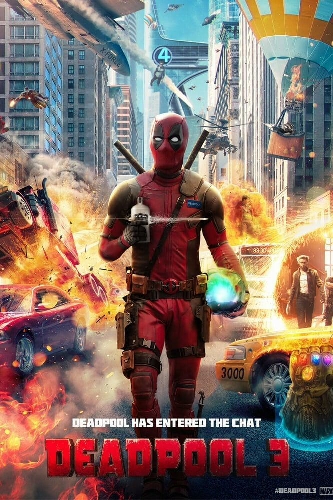If you haven't already seen Deadpool, then what are you waiting for? With a total worldwide gross of $782,370,866, it's now the highest-grossing R-rated film of all time, so expect other films to desperately try to mimic its achievements.
We were all hoping that Deadpool would be a hit, but none of us were expecting it to have been such a spectacular success. That would be incredible for any film, let alone an R rated film that only ended up getting made because of positive audience reactions to leaked test footage, and based on a character who, whilst popular with comic fans, was not recognised among the general public, and it's success is nothing short of a miracle. We'll be talking about the overwhelming success of the film for years to come.
Deadpool having crushed box office records left, right, and centre, and with many more expected to be beaten as it continues its amazing run, Hollywood studies are no doubt already working hard to try to replicate its success.
Lightning never strikes in the same place twice, so rather than being a one off hit, the success of Deadpool could have major repercussions for the film industry from this moment on. Here are five possible ways that the Merc with a Mouth's cinematic outing could affect the motion picture industry as a whole.
1. It Will Make Studios More Open To Taking Risks
This one goes without saying really, but it could actually be the most monumental of Deadpool’s achievements. Hollywood has never been keen on taking risks. Usually, a major studio production will only get the green light if certain elements are in place to ensure that it ends up being a moneymaker. It has to feature name actors, it has to be based on a popular enough franchise, it has to be rated PG-13 even if a R rating would be far more appropriate etc.
But perhaps Deadpool will finally be the film that teaches them that it’s okay to break from the formula, that taking and operating outside of you comfort zone really zone really can payoff.
After all, Deadpool comes nearly seven years after Ryan Reynolds first appeared as the character (although they got his portrayal horribly wrong) in 2009’s X-Men Origins: Wolverine. In that time, it seemed unlikely that the film would be made, and it was mostly an on/off project. Eventually, after some test footage somehow made it’s way online and received an overwhelmingly positive response from fans, Fox went ahead and made the damn film. We don’t usually applaud people for leaking confidential material but in this particular case we feel the need to applaud whoever it was.
So, when you combine the fact that Deadpool was only given to go-ahead at the last minute, with the fact that the character has never been anywhere near as recognisable as many of his big screen counterparts, the fact that Ryan Reynolds, whilst being popular, has never been a hugely bankable star, that Tim Miller was a first time director with an unproven track record, and, most noteworthy of all, the fact that it was rated R and not PG-13, and it looked like you have the recipe for a failure.
But the box office numbers speak for themselves (thanks, in no small part, to the marketing, which we discuss in the next section), and man, they speak loudly. Maybe now the rest of Hollywood will take heed and be prepared to make films that stray from their conventional formula, rather than desperately rushing to adapt the most recent bestselling YA novel. Maybe we could be seeing many more films like Deadpool in the near future
2. More Zany Marketing Campaigns
The key reason for Deadpool’s success was its bizarre and hugely creative marketing campaign. Maybe Fox released that, after screwing up the marketing of Fantastic Four (they barely made the general public aware of the film until shortly before its release) that they needed to go back to the drawing board and devise a new strategy. Which they did, and then some.
Not only did the marketing push begin months ahead of the release, but it was, well, unusual to say the least. Not only was Deadpool literally everywhere you looked, but the strategies were so bizarre that even people with no interest in superhero movies had to stop and stare.
The first teaser of Deadpool parodying the famous image of Burt Reynolds lying on a bear-skin rug. Releasing posters disguising it as a rom-com to make people especially aware of its Valentine’s Day release. Releasing enormous roadside billboards showing an emoji of a skull, a grinning piece of sh.., er, feces, and the letter L. Having Deadpool interrupt an interview that Ryan Reynolds was giving with presenter Mario Lopez to confirm that the film would be R rated, and many more examples. Creative marketing has never been something new, but Deadpool completely hit it out of the park.
Does this mean that we could be seeing a huge change in how films are marketed in the near future? Will studios adopt the notion of ‘the crazier the marketing, the more successful the film?” It certainly appears that way.
3. It Could Put An End To Hollywood Desperately Catering To The Chinese Market
Over the last few years, China has become the second biggest market in the world for Hollywood movies, and could even overtake the US if things continue as they are. As a result, many major productions are now made specifically to cater to a Chinese audience, with films like Iron Man 3 having spirit versions made to appeal more to a Chinese audience (it grossed $121 million in China), whilst films like Transformers: Age of Extinction were partially filmed in Hong Kong to try to increase its Chinese appeal, and lo and behold, it went on to gross $320 over there, making it the top-grossing film in the country until Furious 7 was released there the following year. Disney also gave The Force Awakens a gigantic marketing push in China, and it clearly paid off as the Chinese gross is currently sitting at 125 million, so expect the same treatment for future Star Wars movies.
So surely Deadpool will be a huge hit in China when it’s released over there, right? Right? Wrong actually. It’s been banned over there. Because of its gratuitous violence and profanity, the Chinese will sadly not be able to experience the red-clad mercenary on the big screen. Whilst its hugely unfortunate that it won’t be released over there, and whilst censorship is absolutely horrid in any form, it seems like in the long run, it won’t affect the film at all. When it was first reported that Deadpool was banned over there, many fans believed that it meant that the chances of a sequel were dead and buried. But, with it exceeding all expectations elsewhere, that clearly is not the case.
A sequel is definitely happening, and it looks like we’ll be seeing a lot, lot more of Deadpool.
So does this mean that Hollywood will begin to stop viewing China as such an important market. Definitely not. But it does prove that a Chinese gross is not essential for a film to be a huge hit. Whilst it can be great for studios when their movies do well over there, Deadpooltaught us that it simply isn’t necessary to cater every film to a Chinese audience.
The domestic revenue, and the foreign gross from other countries, can be more than enough. Just imagine how much money could be saved if studios no longer had to pay for huge Chinese marketing campaigns or filming separate footage for alternate Chinese cuts.
4. More R Rated Superhero Films
Before Deadpool, the last wide release R rated superhero film was Kick-Ass 2, which was only a very minor hit, and before that it was Dredd, which bombed spectacularly. And with the exception of a few moderate hits like the Blade movies and V for Vendetta, R rated superhero films are usually few and far between. And, as much as we all love superhero films, let’s face it, it’s now at a point where we’re basically getting the same thing over and over again.
So instead of constantly making films that appeal primarily to the teenage boy, how awesome would it be to have more adult-oriented superhero movies that embrace their mature content in a way that their PG-13 counterparts never could. Deadpool would not have half the film that it was had it not been for its awesome gore and creative cussing, and it sure as hell left us all hungry for more. Similarly, Daredevil and Jessica Jones were both set in the MCU and they featured R level violence, so its becoming increasingly obvious that audiences have a thirst to see much more adult superheroes on screen.
And now, it seems like we will finally be getting them. Who knows, maybe now the long awaited Spawn reboot will finally get off the ground? As Deadpool would say “f**k yes!"
5. A Possible Crossover between The Marvel Cinematic Universe And The Fox Marvel Films
Okay, this one is very speculative, but once you analyse it, it actually begins to make a lot more sense than it may sound.
Since purchasing Marvel in 2009, Disney have been increasingly bitter and hostile to both the X-Men and Fantastic Four. This is because the film rights to both super teams were purchased by 20th Century Fox long before Disney had control of Marvel, and the House of Mouse are not happy that another studio earns profits from characters which they now own.
This basically means that Disney are more or less trying to move both the X-Men and Fantastic Four out of the Marvel canon. A few examples include editing out the characters from iconic pieces of artwork, cancelling and limiting their comic series, not featuring them in most recent Marvel video games and TV series, producing little new X-Men or Fantastic Four merchandise, ordering artists not to include the Fantastic Four in Marvel’s 75th anniversary postcards, and tons of other spiteful acts that we don’t have room to go into here.
Although the X-Men movies have generally been financially successful, the critical and financial mauling of last year’s Fantastic Four movie seemed to suggest that perhaps Fox should just relinquish the rights to the Marvel characters which they own and sell everything back to Disney. Except the success of Deadpool proved that Fox’s Marvel movies are certainly here to stay.
So perhaps Disney might stop being so spiteful and actually behave in a way that would benefit both themselves and Fox. As both the Disney owned Marvel Cinematic Universe and the Fox owned X-Men series have been their own thing up until now, maybe its time to consider a crossover between both franchises that both studios could profit from.
Keep in mind that the upcoming Spider-Man: Homecoming reboot will be distributed by Sony, not Disney, despite being set in the MCU, and that Deadpool was constantly breaking the fourth wall in his movie, referencing both acknowledging that different actors had played Professor X, meaning that sticking to established continuity will not be an issue. He even references the MCU twice in the film (after the end credits), so maybe it could be possible, somehow, for Deadpool to officially crossover with the MCU.
6. More Moderate Budget Films
Apart from a few other films like Dredd, which cost around $45 million, we rarely see comic book films, or films with Deadpool's level of hype, made for so little. That looks like it's about to change
Deadpool was made for $58 million, which, in the grand scheme of things, is not a lot, especially by superhero standards. It's already made more than eight times that amount, which is pretty amazing. This is very likely a sign that Hollywood will try to make big, ambitious films on more moderate budgets in the future, rather than sticking with the mentality that everything has to be as expensive as possible in order to be a hit.
Also, in this particular case, the reduced budget suited Deadpool perfectly. It's not The Avengers, and it's not Guardians of the Galaxy. Part of the charm of Deadpool is that, similar to the Punisher and Daredevil, he's a character who operates on a street level.
Do we want to see Deadpool fighting battles that destroy entire cities and engaging in huge scale spaceship combat? Of course not. We want to see in smaller, more up close and personal (and more gruesome) skirmishes that reflect who he is, a special forces operative turned freelance assassin who sticks his neck out for the little guy. He's not Iron Man or Thor, and that's just how we like him
7. More Major February Releases
January and February are usually seen as being where big movies are sent to die. With a few exceptions, such as 2010's Alice in Wonderland, which went onto gross over one billion dollars worldwide, blockbuster films are rarely released at this time, and the last superhero film released in February was the widely panned Ghost Rider: Spirit of Vengeance. But with Deadpool raking in the cash like crazy, it now seems like summer and Christmas will no longer be the primary release periods for many major films in the future.
And it would make sense, seeing as there's usually so many high profile films released during the summer season that it often becomes something of a bloodbath, with each one desperately trying to out market and out perform the other. And as for Christmas, as theHobbit films and The Force Awakens taught us, all it takes is for one big film to come along, and suddenly nothing else stands a chance. So rather than being seen as a time when major releases don't stand a chance, it now appears that the early months of the year will be highly desirable new homes for them. So be prepared to start going to the cinema a lot, lot more during these months.
8. More Freedom For First Time And Less-Known Directors
Deadpool was the first film directed by Tim Miller, who was previously nominated for an Oscar for designing the title sequence on 2011's The Girl With The Dragon Tattoo.
Usually, when first time directors are hired for major films, a lack of creative control is to be expected, with the studios heads often calling the shots. An example would be how Carl Rinsch was locked out of the editing room of 47 Ronin and was only allowed to have very limited involvement with the post-production process.
Even the previous 20th Century Fox Marvel films are not immune to this issue, with the much published conflicts that they had with director Josh Trank on last year's Fantastic Four reboot resulting in a complete mess of a film.
With Deadpool however, this was clearly was not the case, as Fox took a step back and allowed Miller the creative freedom to make a violent, witty and bold picture that challenged what we have come to expect from Hollywood. Giving the director more authority to call the shots clearly resonating with the critics and audiences who loved the film, and will hopefully be a sign for better things to come in the future.
About the Deadpool 3 movie

Deadpool 3 September 6th, 2024
Official plot synopsis for Deadpool 3 has yet to be revealed.
Directed by TBA, Deadpool 3's release date is September 6th, 2024.
Stay up to date with the latest news on Deadpool 3 by liking Scified on Facebook and by following us on Twitter and Instagram! Also, consider subscribing your email to our Deadpool Movie News blog for instant notifications of when new posts are made!

















